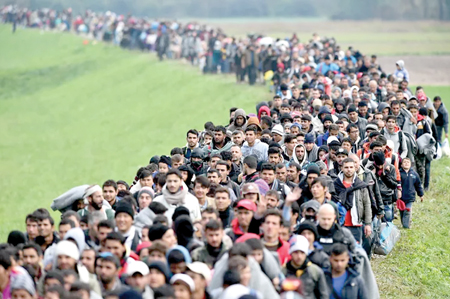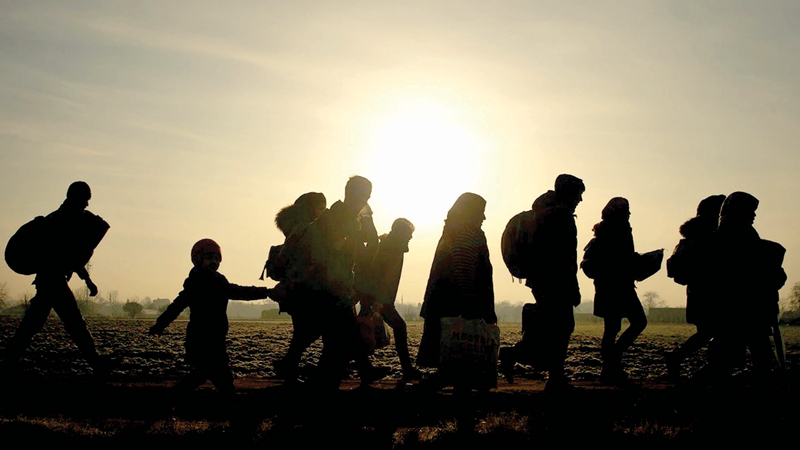 Hope springs eternal in the human breast. Hope for a better future, hope for better times and hope for justice. And if you are a refugee – a person fleeing his or her country due to conflict, persecution, abject poverty, Climate Change, oppression or another factor – hope is usually the only thing that helps you to live. Hope is life itself for these people. And others must give them hope.
Hope springs eternal in the human breast. Hope for a better future, hope for better times and hope for justice. And if you are a refugee – a person fleeing his or her country due to conflict, persecution, abject poverty, Climate Change, oppression or another factor – hope is usually the only thing that helps you to live. Hope is life itself for these people. And others must give them hope.
A refugee is someone who fled his or her home and country owing to “a well-founded fear of persecution because of his/her race, religion, nationality, membership in a particular social group, or political opinion”, according to the United Nations 1951 Refugee Convention. Many refugees are also in exile to escape the effects of natural or human-made disasters.
On the other hand, asylum seekers are refugees who have fled their homes as refugees do, but their claim to refugee status is not yet definitively evaluated in the country to which they fled. Another category, called Stateless persons, do not have a recognised nationality and do not belong to any country. Statelessness situations are usually caused by discrimination against certain groups. Their lack of identification — a citizenship certificate — can exclude them from access to important Government services, including health care, education or employment.
Every minute 20 people leave everything behind to escape war, persecution or terror. The UN High Commissioner for Refugees (UNHCR) has selected the theme ‘Solidarity with Refugees’ as this year’s theme for the World Refugee Day which falls on June 20. Solidarity means honouring refugees not just with words but with actions. It means listening to them and making space for their stories. It means defending their right to seek safety and finding solutions to their plight, ending conflicts so they can return home in safety.
Critical support
The number of displaced people is at a record high with nearly 123 million people forced to flee. Brutal funding cuts compounded by growing anti-refugee sentiment are putting millions of lives at even greater risk. Critical support such as food, water, shelter and medicine has reduced or is on the verge of stopping all together.
 It means ensuring they have opportunities to thrive in the communities that have welcomed them and providing countries with the resources they need to include and support refugees. But above all, solidarity means saying, clearly and courageously, that refugees are not alone and that we will not turn our backs.
It means ensuring they have opportunities to thrive in the communities that have welcomed them and providing countries with the resources they need to include and support refugees. But above all, solidarity means saying, clearly and courageously, that refugees are not alone and that we will not turn our backs.
The 1951 Refugee Convention and its 1967 Protocol help protect them. They are the only global legal instruments explicitly covering the most important aspects of a refugee’s life. According to their provisions, refugees deserve, as a minimum, the same standards of treatment enjoyed by other foreign nationals in a given country and, in many cases, the same treatment as nationals.
The 1951 Convention contains a number of rights and also highlights the obligations of refugees towards their host country. The cornerstone of the 1951 Convention is the principle of non-refoulement. According to this principle, a refugee should not be returned to a country where he or she faces serious threats to his or her life or freedom. This protection may not be claimed by refugees who are reasonably regarded as a danger to the security of the country, or having been convicted of a particularly serious crime, are considered a danger to the community.
Some basic rights, including the right to be protected from refoulement, apply to all refugees. A refugee becomes entitled to other rights the longer they remain in the host country, which is based on the recognition that the longer they remain as refugees, the more rights they need. The UN refugee agency will mark World Refugee Day with a rich and varied program of events worldwide. The UNHCR was set up in 1951 to help the estimated one million people uprooted after World War II to return home. In 2001, a special UN General Assembly Resolution was adopted to declare the former African Refugee Day as the International Refugee Day as an expression of solidarity with Africa, which had the highest number of refugees.
The General Assembly which noted that 2001 marked the 50th anniversary of the 1951 Convention Relating to the Status of Refugees and that the Organisation of African Unity (OAU) had agreed to have the International Refugee Day to coincide with African Refugee Day on June 20.
The focus of the World Refugee Day this year will be on expressing solidarity with millions of refugees around the world, mostly in Africa and Asia, including Palestinian refugees, who have been battered further as a result of Israel’s war on Gaza.
The idea of expressing solidarity with refugees is that we can do something, even a single act of charity or compassion, that will benefit the refugees and rekindle their hopes for a better life ahead.
Even taking a moment to appreciate the tribulations they have gone through and recognising their courage and resilience in the face of adversity will reaffirm our faith in humanity.
“World Refugee Day is an expression of solidarity with people who have been uprooted from their homes by war or persecution.
This not about sharing a burden. It is about sharing a global responsibility, based not only the broad idea of our common humanity but also on the very specific obligations of international law,” says UN Chief Antonio Guterres.
Multiple new factors
He has warned of multiple new factors that are causing displacement of people from their native countries. People can also be displaced internally or within their countries – they are called Internally Displaced Persons (IDPs). Sometimes they can go to a strange new area in their own country, without help from anyone. These IDPs actually outnumber refugees. Although they are not refugees in the strictest sense of the term, the UNHCR is caring for around 15 million of these IDPs, which is, in fact, more than the total number of refugees of concern to UNHCR. The leading countries with IDPs include Sudan, Angola, Myanmar, Turkey and Iraq.
Many factors causing displacement (to other countries or internally) did not exist at the time of UNHCR’s founding or when the major international refugee and statelessness conventions were created. “UNHCR traditionally was supporting refugees, people that would cross a border because of a conflict or persecution,” he said. “But now we see that more and more people are crossing borders because of extreme poverty, because of the impact of Climate Change, and because of their inter-relation with conflict. So there are new patterns of forced displacement and the international community needs to be able to tackle those challenges.”
Indeed, the world must take cognizance of new issues such as displacement due to Climate Change and act urgently to formulate viable solutions. Rising sea levels, increasing desertification, weather-induced flooding, and more frequent natural disasters have become a major cause of population displacement in several parts of the world, a trend that is very likely to continue. According to UN predictions, there could be as many as 50 million ‘environmental refugees’ in the next few decades.
Refugees often live in dire conditions, though some countries do have well-equipped established camps. Unfortunately, countries to which refugees flee are themselves poor and can hardly afford to provide creature comforts to a large population of displaced persons. For example, Kenya gets refugees from many other countries in Africa. This contrasts sharply with the attitudes of many Western countries which simply want to “stop the boats” and close their borders to all would-be refugees and asylum seekers. Many countries also have plans to send refugees to third countries such as Rwanda. In recent years, only Germany has taken in more refugees than Third World nations.
Possible solutions
More than half of all refugees of concern to UNHCR live in urban areas. They all face three possible solutions: repatriation; local integration or resettlement. When a person or family decides to leave their home country and seek asylum elsewhere, they generally travel to the closest safe area possible. Thus, while the world’s largest source countries for refugees include Afghanistan, Iraq, and Sierra Leone, some of the countries hosting the most refugees include countries such as Pakistan, Syria, Jordan, Iran, and Guinea.
The refugee problem is a blot on humanity. But it is unlikely to go away if the world’s conflicts are not resolved. Peace is the one vital factor that can create a conducive environment for refugees to return to their home countries. The international community should strive to resolve these problems, which will be a ray of hope for refugees the world over.









